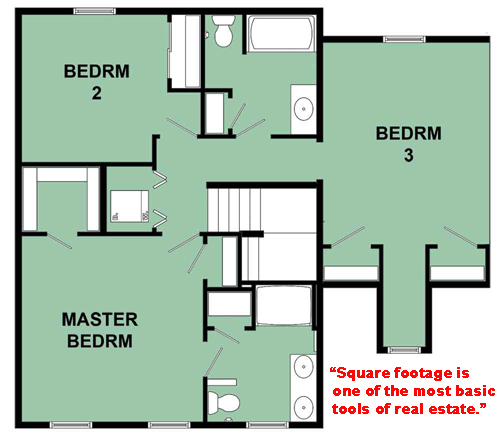Local Realtors Beware
Be careful about what square footage numbers you use in your real estate marketing and MLS data. Measurement errors, even small ones, can mean thousands of dollars of “over-inflated value” or conversely, in lost potential revenue for the seller – and these errors and mis-representations are landing real estate professionals in court.
Let’s face it, Square Footage is one of the most basic tools of real estate. Salespeople often use it as they add listings to the MLS or write advertising copy. Potential buyers are depending on it as they rank one property against another. Since Real Estate transactions are one of those MAJOR life purchases, many buyers invest lots of time building their own spread sheets and other tools as they filter down their favorite potential properties to the one or two they make an offer on. Buying Real Estate is significantly more expensive and more serious than purchasing a used car and when mistakes or errors are uncovered post sale, there is often blood in the water.

All that said, it seems as if few real estate professionals ever questioned a property’s square footage as they copied it from the tax records, or the the developer’s floor plan, or even the listing in the MLS record.
Do you think size—square footage—really matters? After all, if buyers love a property, do they really care if it’s 3,300 square feet or 2,960 square feet? Obviously it is a case by case situation. However, we know that when the housing market is strong, people generally don’t care as much about precision, but in a soft market, people become more demanding.
Size affects everything from whether the side-by-side refrigerator will fit in the kitchen to whether the HVAC’s capacity is large enough to cool the space – not usually uncovered till that week of 100-degree days comes to town. But more importantly, consumers are conscious of square footage and its impact on value. Not only that, numbers don’t lie – and a case can easily be made with numbers as they equate to value, overspent dollars, dollars never captured (lost), and in a courtroom.
Measurement errors, even small ones, can mean tens of thousands of dollars, so it’s not surprising that square-footage disputes are making news—and landing some real estate professionals in court.
Here’s an Interesting Square Footage Real Estate Lawsuit
In Brown v. Roth (N.C. Ct. App.) (1999), the court held that a broker who provided inaccurate data might be liable for a breach of fiduciary duty or negligence unless he “exercised reasonable care in obtaining the square footage information and communicating it to the buyer.” Ouch!
“OK… So Whose Square Footage Numbers Can I Trust?”
Obviously, part of the challenge in supplying accurate square footage to clients is finding a reliable source of data. Many real estate brokers and agents rely on the square footage contained in the tax assessor’s records. Those records are a convenient source of data, but public records were never intended to be used by the real estate industry as a “trusted” source of square footage. These estimates were created by and for an appraisal system that is a “general, mass-market, tool” run by bureaucrats (who sometimes don’t really care about a specific property in their database).
If you sit down and take a serious look at the various sources of square footages – as in comparing:
- appraisals
- MLS listings
- public records
you will discover that both the percentage-error, and actual size of some errors is troubling! Scary if you take the biggest error you find and then think back to a big sale you’ve closed in the past few years and assume that your biggest deal was “off” by that much! Run the numbers and then picture a lawyer making a case against you for money damages. Such a lawsuit could be catastrophic.
As a Realtor, What Can I Do?
One way to avoid liability is to simply avoid the question of square footage, a strategy the NATIONAL ASSOCIATION OF REALTORS® recommends. Almost all MLSs contain a general disclaimer indicating that although information is believed accurate, it’s not guaranteed.
Generally, the courts have held that these disclaimers protect real estate professionals from liability for inaccurate square footage numbers. Unfortunately though, you are not really serving your prospective clients all that well by taking the “easy way out…”
A better approach many think, where you can still reduce liability, but perhaps better serve your clients, is to give your prospective buyers a disclosure form that explains the source of the square footage information. Several states are considering such a default position and the state of Colorado has already adopted a standardized form for all residential property sales. Although this form doesn’t settle on one true measurement standard (as there are none), it’s a big step in the right direction as far as informing the buyer to measure themselves, hire a surveyor or take the square-footage numbers with a grain of salt – thus protecting both the consumer and the real estate professional.
Will There Ever Be A Square Footage Standard?
A national standard sounds like a pipe dream, as creating a widely-accepted standard would be an extremely complex challenge. Frankly, no one system could account for every possible scenario. Someone or some agency would have to physically measure every property ever built! What if a portion of that property was not-permitted? The complexities are endless.
Other than location, Square Footage is one of the fundamental Building Blocks of real estate valuation. A national standard, whatever its basis, would serve the consumer and Real Estate Professional well.
The information on this Real Estate BLOG is for general information purposes only. Nothing on this or associated pages, documents, comments, answers, emails, or other communications should be taken as legal advice for any individual case or situation. The information on this website is not intended to create, nor constitute an attorney-client relationship.

Business Attorney Valerie Kramer understands that investing some time in getting your business contracts in order, handling common legal transactions, or negotiating a lease should be cost-effective.
Valerie Kramer is also a Real Estate Attorney and helps Property Owners, Buyers & Sellers, Real Estate Brokers, Commercial Tenants and others involved in everyday real estate transactions and disputes. Valeries’s clients get maximum value for every penny spent, without padded hours for unnecessary “additional services.”
Call me personally – (619) 259-5030
– Let’s talk through your issue or opportunity.
We Are Your San Diego Business Attorneys…
We are proud to serve San Diego and the San Diego County Area.

